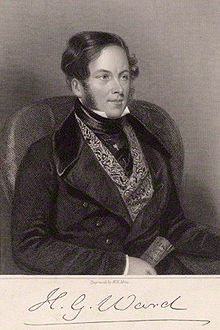Henry George Ward
|
Sir Henry George Ward GCMG |
|
|---|---|

Henry George Ward, 1842 engraving by William Henry Mote, after James Holmes.
|
|
| 11th Governor of British Ceylon | |
|
In office 11 May 1855 – 30 June 1860 |
|
| Monarch | Queen Victoria |
| Preceded by |
Charles Justin MacCarthy acting governor |
| Succeeded by |
Henry Frederick Lockyer acting governor |
| Personal details | |
| Born | 27 February 1797 |
| Died | 2 August 1860 (aged 63) |
Sir Henry George Ward GCMG (27 February 1797 – 2 August 1860) was an English diplomat, politician, and colonial administrator.
He was the son of Robert Ward (who in 1828 changed his surname by sign manual to Plumer Ward) and his first wife Catherine Julia Maling, daughter of daughter of C. J. Maling of West Herrington, County Durham; and the cousin of William Ward and William George Ward. He was born in London on 27 February 1797. Educated at Harrow School, and sent abroad to learn languages, he became in 1816 attaché to the British legation at , under Sir Edward Thornton. He was transferred to The Hague in 1818, and to Madrid in 1819. He was appointed joint commissioner to Mexico in October 1823, and returned to England in 1824; again went out to Mexico in 1825, as chargé d'affaires, but returned and retired from the diplomatic service in 1827.
In December 1832 Ward entered the House of Commons, elected as Member of Parliament (MP) for St Albans, and sitting for that seat until 1837; and then for Sheffield from 1837 to 1849. His reputation was as an advanced liberal, and he regarded classical economics as authoritative, as witnessed by his opposition to the Ten Hours Bill.
Ward's career in Parliament was marked by his hostility to the Church of Ireland, on which he moved a yearly resolution. The first occasion for this motion, that "That the protestant episcopal establishment in Ireland exceeds the spiritual wants of the protestant population", was 27 May 1834, and it was particularly significant in British politics: it was brought at a time when the cabinet of Earl Grey was deeply divided on Irish issues. The timing owed to the prompting of Lord Durham, who wished to see an administration of a more Radical complexion. On the same day Lord Ripon, Edward Stanley, Sir James Graham, and the Duke of Richmond resigned office because they could not support the appointment of an Irish church commission. Ward had given notice of the motion, but behind the scenes the Cabinet could not agree a common approach, and a number of them had audiences with the King. A group around Edward Ellice saw this as the occasion for Stanley and Graham to quit the administration. The outcome was only resolved late in the evening, when Stanley and Graham were already gone, and the Marquess of Lansdowne threatened to resign himself unless Viscount Althorp did as he was told by Grey, moving an adjournment of the motion in the Commons, while proposing an enquiry into the Irish church. On 2 June Ward's motion was voted down by 396 to 120.
...
Wikipedia
